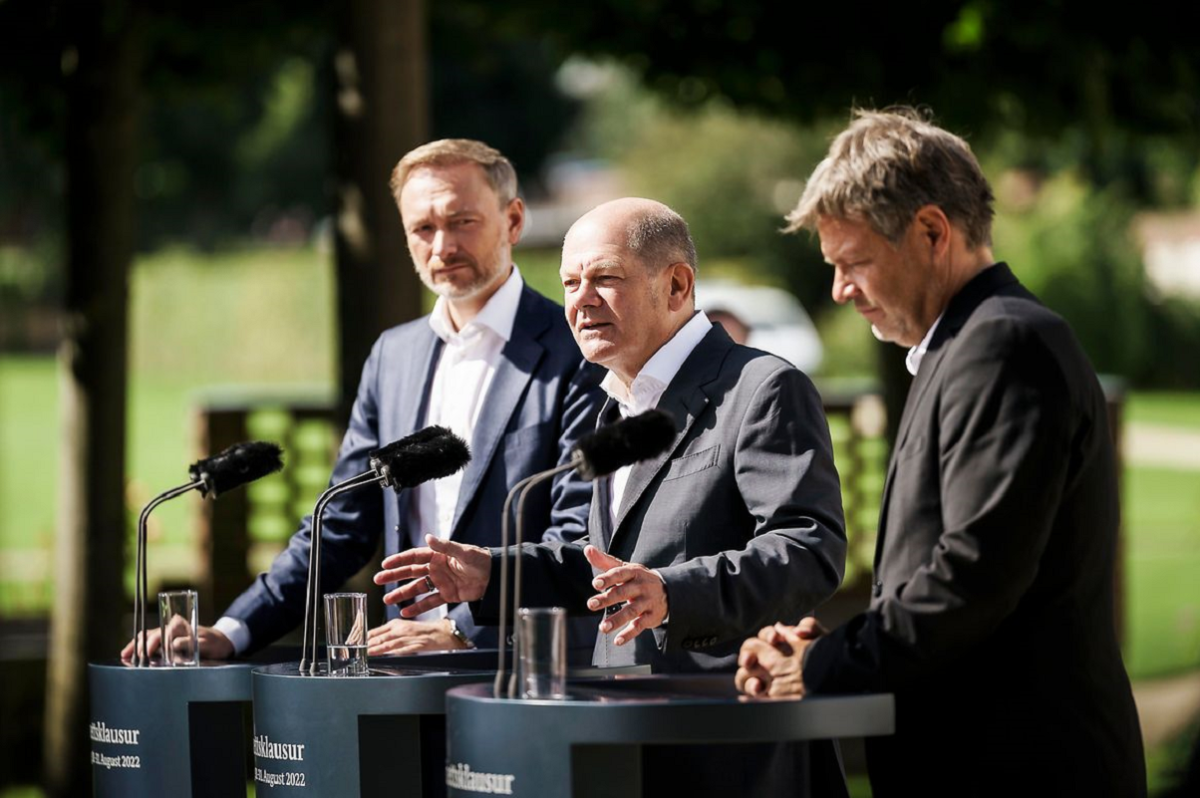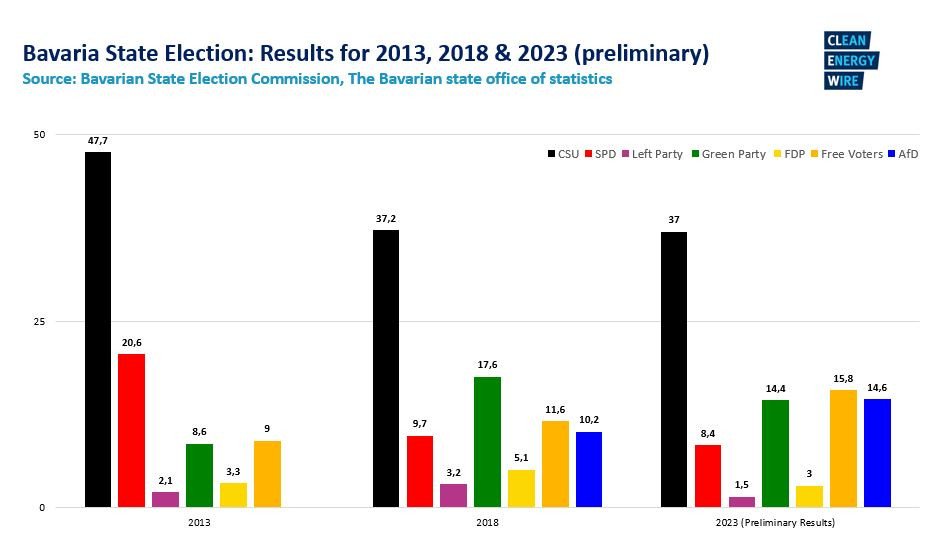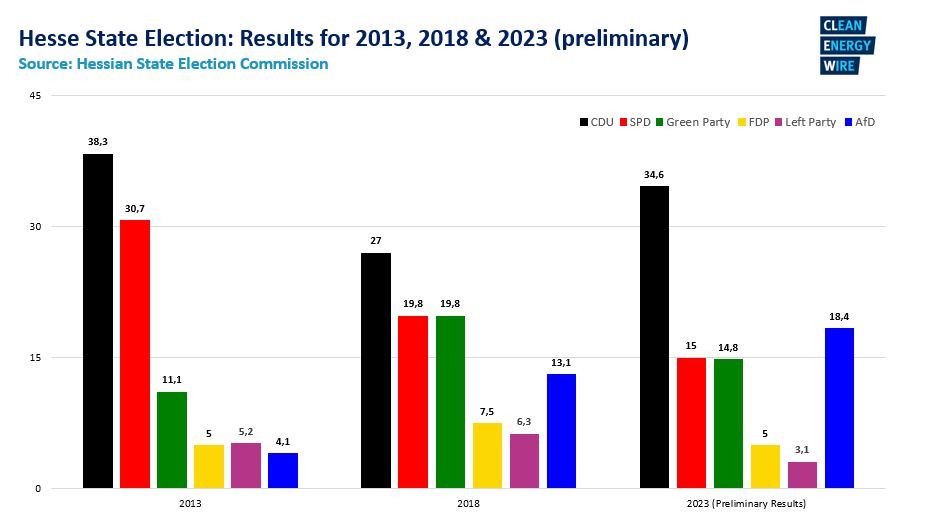Scholz’s coalition parties take beating as far-right populists surge in western German state elections
Voters in the western and southern German states have delivered a blow to the German federal government coalition parties and a political shift to the right in two state elections in Hesse and Bavaria. In both elections, the conservative CDU/CSU alliance, which is the largest opposition party at the federal level, secured a safe victory. At the same time, chancellor Olaf Scholz’s Social Democrats (SPD), the Green Party and the Free Democrats (FDP), all shed a substantial share of their votes compared to the previous election in 2018. However, despite the clear victory of the conservative alliance (34.6% in Hesse and 37% in Bavaria) according to preliminary results, populist parties turned out to be the elections’ greatest winners in the states that together represent about a quarter of Germany’s economic output and population.The far-right Alternative for Germany (AfD) became the second strongest party in Hesse (18.4%), the first time it achieved this position in a western German state, and the third strongest one in Bavaria (14.6%), only behind the more moderate conservative populist party Free Voters (15.8%).
The election results in two of Germany’s most affluent and economically powerful states are seen as a damning verdict on the performance of chancellor Scholz’s coalition government after two years of its four-year term. The strong showing of the AfD in western Germany contradicted the common perception that the far-right populists are a protest party that is largely confined to disadvantaged voters in poorer eastern Germany, and cemented its status as the main camp for voters rejecting progressive politics more broadly. Germany’s flagging economy, which was hit by high energy prices following Russia’s invasion of Ukraine, climate policy and the energy transition, as well as immigration, had been the most important topics for voters according to exit polls published by public broadcaster ARD in both Bavaria and Hesse.
While AfD voters named immigration as the most influential topic for their decision, the success of the climate-denialist party also is likely to trigger a debate about the impact of ambitious climate policies and controversial emissions reduction efforts initiated by the coalition of the SPD, the Greens and the FDP. Decisions such as shutting Germany’s remaining nuclear plants during the energy crisis, and introducing a law on banning fossil fuel heating amid skyrocketing energy prices, had been a constant source of disputes among the government parties and made the three-party government prone to attacks from the opposition conservatives, as well as the AfD and Free Voters, who claimed that the coalition ignored the concerns of many citizens. The strong performance of the far-right AfD is reinforcing concerns among centrist parties about the election year 2024, when both the European elections in spring and three state elections in eastern Germany in autumn could elevate the party, which rejects all emissions reduction efforts and international climate agreements, even further.
“The result of an election campaign that relativised the climate crisis" - activist
Political scientist Thomas Leurer from the University of Würzburg commented in the newspaper Main Post that the result in Bavaria showed a clear shift to the right, adding that it was not specific for the state. “This chimes with the current trend,” Leurer argued. Taken together, all parties who “position themselves on the right or on the far right” in Bavaria now represent “a solid two-thirds of voters.” Climate activist group Fridays for Future called the results in Bavaria “horrifying.” It represented “the result of an election campaign that relativised the climate crisis, made populist right-wing slogans mainstream, and stoked hate against climate activists,” commented Fridays for Future representative Luc Ouali according to news agency dpa.
The election results are likely to reverberate at the federal level. With Scholz’s interior minister, Nancy Faeser, delivering the SPD’s worst result in decades as the party’s top candidate in Hesse, a debate about her role within the government coalition opened up already on election night. In her role, Faeser is responsible for managing migration, and her performance became increasingly contested during the summer, when more and more cities and municipalities in the country signalled they struggled to deal with rising numbers of migrants. More broadly, the poor showing is also seen as warning for chancellor Scholz himself, whose grip on the coalition parties has been described as too hesitant and technocratic for a head of government attempting to stem multiple crises while trying to transform the economy towards climate neutrality.
At the same time, the Greens saw their hopes dashed to sustain their upward trend from the federal elections in 2021 and sustained disappointing results in both Bavaria in Hesse. In both states, more than half of voters in exit polls said the party did not care enough about creating jobs and supporting the economy and instead “try to tell people how to live their lives,” while it scored poorly with its lenient position on migration. On election night, Hesse’s Green Party leader Al-Wazir explicitly complained that all state parties that are also part of the federal coalition “lacked tailwind [from the federal level] and faced an uphill battle.”
The election was particularly devastating for the FDP, which scored one of its worst-ever results in Hesse and failed to reach the five percent threshold for inclusion in parliament in Bavaria. The first calls by FDP representatives for ending the federal coalition prematurely ahead of next year's round of elections came up immediately after results from Bavaria and Hesse became known.
Commentators put "climate first" approach into question
Ulrich Reitz, in a comment piece for news magazine Focus, argued that the poor results for the government parties in both states showed that its “climate first” approach “is bound to fail.” The intense debate about Germany’s heating energy law earlier this year showed “how big a role social questions are playing.” While most voters continue to believe that rigorous climate action is necessary, particularly the Greens’ approach would be seen as too intrusive, “which is why they have done the topic a disservice,” he argued.
Despite the populist surge in both states, the incumbent conservative state premiers Boris Rhein in Hesse (CDU) and Markus Söder in Bavaria (CSU) are likely to stay in office, thanks to their own parties’ decent results. In Bavaria, the SPD fell to 8.4 percent, the Greens to 14.4 percent and the FDP to 3 percent, meaning the party missed the 5-percent threshold to enter parliament. The Greens were the biggest losers in the election, shedding 3 percentage points, most of which went to the CSU instead. State premier Markus Söder has signalled he is ready to continue his coalition with the Free Voters, whose leader Hubert Aiwanger recently shook off criticism about controversial calls for “taking back democracy” and allegations about fascist activities in his youth. The Free Voters became the second strongest in the state bordering the Alps, and backed by the solid result, they are likely to reinforce their efforts to gain influence at the federal level also.
In centrally located Hesse, the SPD received 15 percent of votes, the Greens 14.8 percent, and the FDP 5 percent, thus narrowly surmounting the threshold. The federal coalition parties received an even greater battering in the state, with the Greens losing 5, the SPD 4.7 and the FDP 2.5 percentage points, with most votes flocking to the CDU instead. With just over 3 percent, the Left Party was voted out of parliament. The AfD in both states benefited most both from voters who had not participated in the previous election, and from peeling many voters away from the CDU/CSU and the SPD, Germany’s formerly dominant political forces. Hesse’s current state premier Boris Rhein now could continue his coalition with the Green Party, who under leader Tarek Al-Wazir would have shrunk significantly as the junior partner in a coalition.




